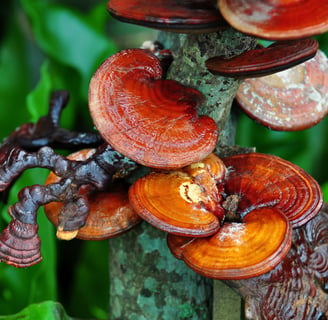GANODERMA LUCIDUM -REICHI
THE MUSHROOM OF ETERNAL YOUTH
Dr.Francesco Pensato
Ganoderma Lucidum, also known as Reishi (its Japanese name), is the fruiting body of a basidiomycete fungus (Mannentake), belonging to the Polyporaceae family.
There are several species of Ganoderma, but the most widely used is the lucidum variety, characterized by a red fruiting body with a strong bitter taste.
It has been revered and used in traditional Eastern medicine for nearly two thousand years. A detailed description of its therapeutic uses appears in a Chinese text dating back to the 1st century BC.
At that time, Ganoderma Lucidum was extremely rare and valued like gold, considered a medicine fit for emperors.
Its legendary healing properties are deeply tied to Chinese tradition—perhaps even more so than ginseng—for promoting overall health, youth, and vitality.
In Japanese and Chinese folklore, it was known as the Divine Herb of Longevity, believed to enhance general health and physical well-being. It earned the nickname "The Mushroom of a Thousand Years."
Modern scientific studies have classified this fungus as a valuable nutraceutical and powerful adaptogen, used in the treatment of over 20 different conditions.
General Properties
There are many varieties of Ganoderma, distinguishable by their color. The most cultivated variety today is Akashiba, or Red Ganoderma.
Over 150 bioactive compounds have been isolated from this fungus, including ganoderic acids, polysaccharides, furans, ribosides, nucleotides, peptides, triterpenes, and germanium. Among these, polysaccharides and triterpenes have been the most studied.
Among the polysaccharides, the most well-known are from the Beta-glucan family, recognized for their strong anti-tumor and immune-modulating activity.
Reishi also contains calcium, iron, phosphorus, vitamins C, D, and B-complex, including pantothenic acid, essential for nerve function.
Adaptogenic Activity
Ganoderma is an adaptogen, with properties similar to ginseng.
The adenosine it contains explains its traditional use in Chinese medicine to relieve nervous tension.
Adenosine relaxes skeletal muscles, has a sedative effect on the central nervous system, and counteracts the stimulating effects of caffeine.
Anti-inflammatory Action – Prevention of Neurodegenerative and Cardiovascular Diseases
Reishi extract has shown anti-inflammatory effects, both orally and topically.
The active compound responsible for this effect has been isolated and identified as a hydrocortisone-like compound—without the side effects of steroidal and non-steroidal anti-inflammatories.
This anti-inflammatory action is crucial because inflammation plays a key role in age-related neurodegenerative diseases, such as Alzheimer’s.
Reishi is also considered useful in mitigating the effects of such diseases, not only due to its anti-inflammatory properties but also for its positive effect on the well-being of the elderly, boosting vitality, cognitive function, and preventing memory loss.
Its anti-inflammatory benefits extend to cardiovascular diseases, where inflammation contributes to their onset.
Immune-Boosting and Anti-Tumor Activity
Reishi’s active ingredients have been classified as host defense potentiators, thanks to their immune-boosting properties.
Due to its ability to strengthen the body’s natural defenses, it is being studied as a cancer-supportive agent—without the unwanted side effects of traditional chemotherapy drugs.
Its anti-tumor effects are mediated by cytokine release from macrophages and T-lymphocytes. Research into Reishi’s anti-cancer properties is rapidly expanding.
Use of Reishi in oncology is focused on:
reducing side effects of chemo- and radiotherapy
prolonging survival
improving patient quality of life
reducing metastasis risk
preventing disease recurrence
These effects are attributed to various compounds in Reishi:
a) Cytotoxic triterpenoids such as ganoderic acids
b) Anti-tumor polysaccharides and their protein complexes
c) Germanium derivatives – Reishi is rich in germanium, which stimulates interferon production and helps relieve pain in terminal cancer stages
d) Dietary fiber – Reishi is rich in β-glucan, chitin-based fibers, and heteropolysaccharides with both pharmacological and physiological carcinostatic activity. These help prevent absorption and promote excretion of carcinogens.
In addition to water-soluble polysaccharides, Reishi also contains other beneficial polysaccharides in its insoluble hemicellulose fraction.
Because β-D-glucan and other cytostatic chitinous compounds are found in the fibrous part of the fungus, Reishi may provide therapeutic benefits in absorbing carcinogens in the digestive tract and help prevent or treat colon and rectal cancer.
Liver Protection
Clinical studies on dry Reishi extract in patients with hepatitis B have shown encouraging results, thanks to its liver-protective, antioxidant, and detoxifying properties.
It is commonly used for necrotic hepatitis and carbon tetrachloride poisoning.
Blood Pressure Regulation
Its antihypertensive effect is attributed to 112 identified triterpenes, with ACE-inhibitory action.
Key compounds include ganoderic acids (B, D, F, H, K, S, Y), Ganoderal A, and Ganoderol A & B.
Anti-Thrombotic Activity
Reishi extract inhibits platelet aggregation, thanks to adenosine and guanosine derivatives.
Blood Sugar Control
Reishi extract effectively lowers blood glucose levels after just two months of use.
Its hypoglycemic effect is linked to increased insulin levels and faster glucose metabolism, both in peripheral tissues and the liver.
In Cosmetics
Chinese women use Reishi for skin beauty, likely due to its positive effect on hormonal balance.
Reishi is also included in Japanese patents for treating alopecia and hair loss.
Pharmacological Activities (Wakan Shoyaku Botany Institute, Tokyo)
In collaboration with Chinese researchers, the Wakan Shoyaku Botany Institute identified the following effects:
Stimulation of lymphocyte production
Enhancement of antibody production and allergy response regulation
Immune-modulating effects
Activation of macrophage phagocytosis
Stimulation of NK cell activity
Production of Interleukin-1 and Interleukin-2
Production of TNF (Tumor Necrosis Factor)
Cardiovascular effects
Hepatoprotective effects
Hematopoietic system regulation
One of the most fascinating aspects of Ganoderma is its "intelligent" or amphoteric action, meaning it can produce opposite effects depending on the condition of the cell.
Laboratory tests show that in normal or underactive lymphocytes, Reishi extract activates the cells. In contrast, overactive cells (stimulated with CoA) are downregulated by the same extract.
This suggests that Reishi can stimulate the immune system when needed and calm it when it's hyperactive, offering a balancing effect.
Toxicity studies confirm that Reishi is safe for human use. Doses of 10 g/day of extract caused no side effects.
Standard Dosage
Dry Extract 4:1 — from 500 mg to 5 g per day, depending on individual needs.
Dr. Francesco Pensato


